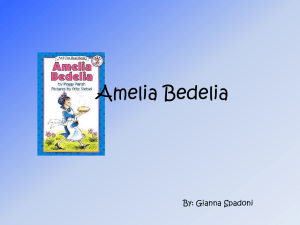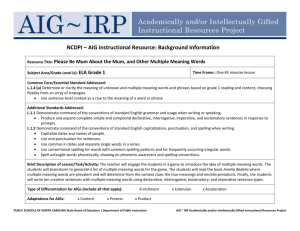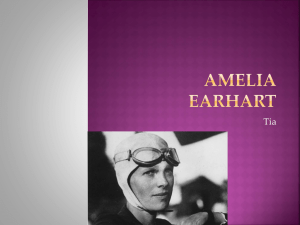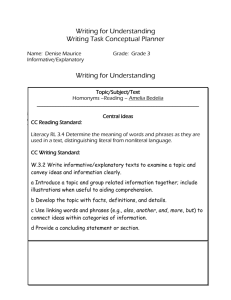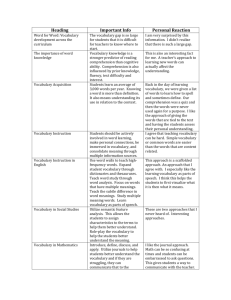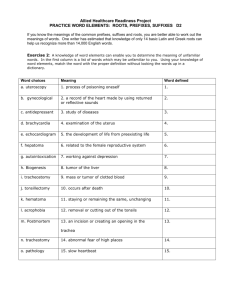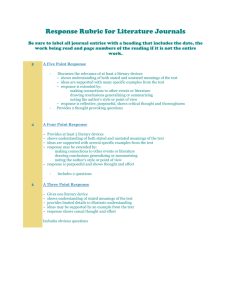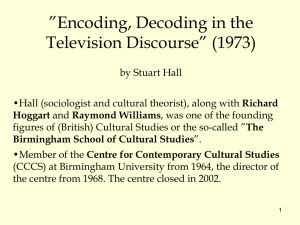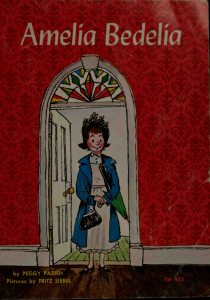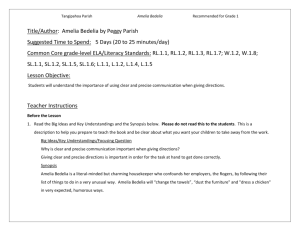Lit. Circles Lesson Plan - DifferentiatedInstruction
advertisement
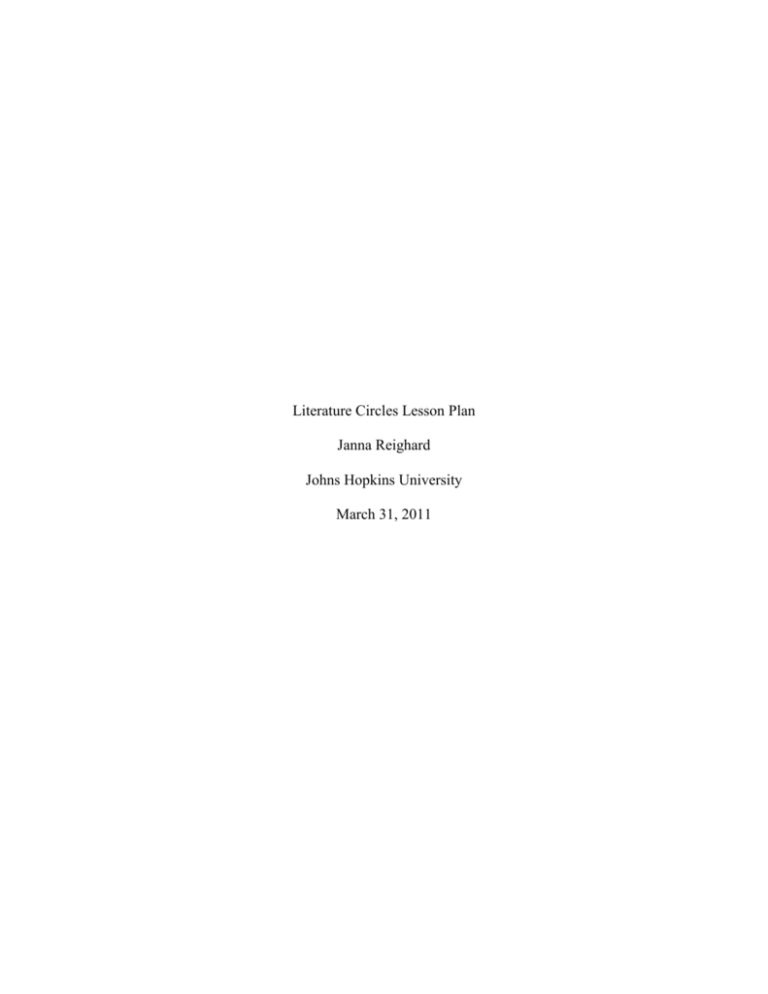
Literature Circles Lesson Plan Janna Reighard Johns Hopkins University March 31, 2011 Title: Words with Multiple Meanings Subject: Language Arts Grade Level: 2 MSDE Indicator(s) 1.2.D.3 Understand, acquire, and use new vocabulary 1.2.D.3.a Determine the meanings of unknown words: Reread; use context clues; read on; use text features Objectives Students will identify examples of words with multiple meanings in text. Materials needed: Marker Chart paper Student Copies of “What Does It Mean?” organizer A variety of Amelia Bedelia books Eight Ate, A feast of Homonym Riddles Why the Banana Split A Chocolate Moose for Dinner The King Who Rained A Little Pigeon Toad On chart paper, write the following 3-column “What Does It Mean?” organizer. Word What the word means What clue helped me determine the meaning of the word? Before Reading Tell students that authors sometimes use words that can have several different meanings. For example, the word ring can mean the sound that a bell makes, or a circle, or a piece of jewelry that you wear on your finger. An author would use other words with the word ring to help us know which meaning she wanted us to have. The author might write: The bell had a loud ring to it; The students formed a ring in the center of the gym; The king placed the ring on his finger. We know the meanings of the word ring from the other words in the sentences. Introduce the story Teach Us, Amelia Bedelia by showing the cover of the book. Ask students to talk with a partner and think about what they know about Amelia Bedelia from reading or hearing about her. Ask for students’ ideas. (Bring out the fact that the meanings of words sometimes confuse her.) Give a brief book introduction stating what the author’s intent was for the book. Suggested book introduction: “Peggy Parish has written several humorous books about Amelia Bedelia, who seems always to get confused. Amelia Bedelia works for Mrs. Rogers by taking care of her house. In this book, Amelia Bedelia is substituting at school until the new teacher gets there. To confuse her character, Peggy Parish uses words that have multiple meanings. For example, Amelia Bedelia is told to call the roll. Instead of calling the names of the students from a class list or class roll, she borrows a roll made of dough from a student’s lunchbox and calls it! There are many other examples of words with multiple meanings. Today we will read the list that was given to Amelia Bedelia by Mr. Carter, the principal. Then, as we read the story, I want you to think about two things: The meanings of the words and how the author let you know what each word meant.” During Reading Display the 3-column What Does It Mean? organizer. Think aloud to demonstrate how you determine the meaning of the words. For example, say, “We talked about the first job- Call the roll. Let’s look at the next job- Plant a bulb. I know that a bulb that we would plant looks something like an onion. Let’s read to see what Amelia Bedelia did.” Open the book to the pages where Amelia Bedelia is reading this job and doing it in her own way (pages 24-28). Talk about how the word bulb can also mean the glass part of a lamp that gives off light when it is turned on. Say, “I am going to write the word bulb on the chart in the first column. In the second column, I am going to write the definition that goes with the meaning on the list—a plant bud that develops underground. In the third column I am going to write that the clue was the word plant because I know that you plant bulbs that grow underground.” Record the information on the 3-column chart. Involve the students in the other examples. Read each job on the list and point out the highlighted word. Discuss what it means in the context of the other words. Then read the book to see how Amelia Bedelia defined the word. Discuss the multiple meanings of the word, but return to the context of the word to determine the author’s definition. Record the students’ responses on the 3-column chart. After Reading Pose the following question to students: “In the story Amelia Bedelia, how did Peggy Parish help you know the correct meanings of the words?” Use the think-pair-share strategy. Establish that the context in which the words were used best determined the meanings of each word. Discuss how knowing the context would help students with future readings. Provide an example from a text that they may currently be reading or from a text that they have already read. Literature Circles (can be split into 2 days if needed) After the whole group lesson, student will participate in literature circles. The teacher will review 5 pre-selected texts that feature words with multiple meanings. o Eight Ate, A feast of Homonym Riddles o Why the Banana Split o A Chocolate Moose for Dinner, o The King Who Rained o A Little Pigeon Toad Students will then choose which book they would like to read with no more than 4 children per group. The teacher will allow the students in each their desired role. o Connector o Word Wizard o Questioner o Illustrator Students will then be given 30 minutes to read and discuss their books. After 30 minutes, students will be given 30 minutes to come up with a way to present the words with multiple meanings in the books. Students can act out the words, make a poster, etc. Allow each group 5 minutes to present the final product. Independent Practice Use other Amelia Bedelia stories to provide practice with determining the author’s meaning through the context of the story. Supply students (individually or pairs) with the attached graphic organizer Have the students make collections of words with multiple meanings. Point out that dictionaries are great sources for finding words with many definitions, such as the word spring that has as many as 36 definitions and the word play that has as many as 67 entries. Have them write as many definitions for each word as they can. Then have the students use the words in sentences. Have other students match the meanings of the words in sentences with the corresponding definitions. Closure/Evaluation Give students practice with vocabulary development using the following format: Select the sentence in which the word is used in the same way as the underlined word in the given sentence. Have you ever seen the play called The Secret Garden? 1. I made a great play in yesterday’s soccer game. 2. Who will play the part of the tricky fox? 3. We are all going to try out for the school play. 4. My dog likes to play catch with me. Name:_______________________________ Date:_______________________________ What Does It Mean? Word What the word means What clue helped me determine the meaning of the word?
